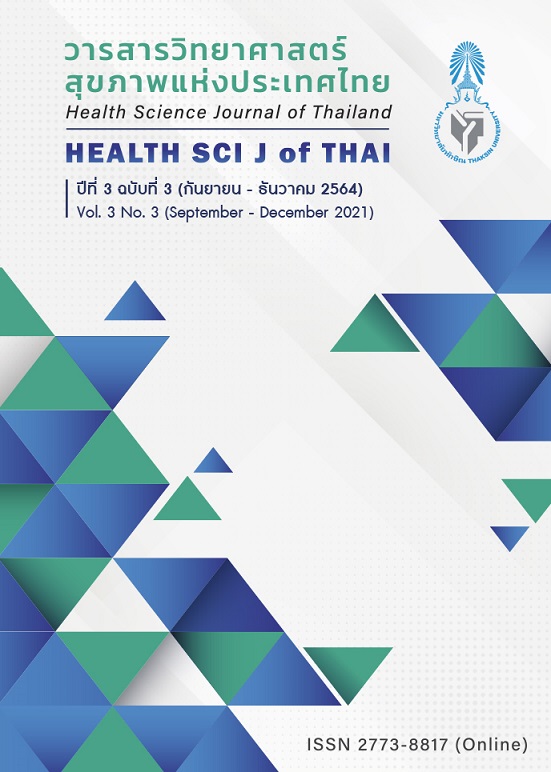Construct Model of Waste Management in Khok Chang, Thanto Sub-district, Thanto District, Yalal Province
Main Article Content
Abstract
This study aimed to construct a model waste management of the Khok Chang community. The key informants were 4 groups: 1) project leaders 2) co-project leaders 3) project members and 4) project mentors; totaling 22 people. The tools in this study were an interview guideline for a focus group. The data were collected from September 1, 2018, to January 30, 2019. The findings of content analysis showed that model waste management of the Khok Chang community consisted of the mechanism of community, establishment by the community, and integration process between government and communities. The model was as follows 1) community membership group 2) civil society forum 3) create partners with government in area 4) create participation processes and 5) create innovation. in waste management. The contextual factors were culture and religion in group and kinship society. The inputs factors were people or organizations both inside and outside the community. The process factors were a process of participation in activities and knowledge transfer, recommendations on community waste management patterns, and outcome factors. The findings suggested that the process should be organized for the community to understand and support the community to build a community management network. It should take into account the context of each area design of participation processes and learning processes in enabling community waste management.
Article Details
References
Pollution control department. Garbage with utilization. [Internet]. 2019 [Cited in 19 June, 2019]. Available from: http://www2.pcd.go.th/info_serv/waste_garbage.html.
Office of the Council of State. The Act defines decentralization procedures for local administrative organizations B.E. [Internet]. 2019 [Cited in 9 June, 2019]. Available from: www.dla.go.th/ work/planlocal.
Stufflebeam DL. Evaluation as Enlightenment for Decision Making. [Internet]. 2019 [Cited in 19 June, 2019]. Available from: https://eric.ed.gov/?id=ED048333.
Khamkeard T. System-wide assessment with CIPP. Journal of promote technology 2003; 30(169): 81-82. (In Thai)
Rangkaew P. The Adoption of the multi-purpose waste pulverizing machine in Saraphi District, Chiang Mai Province. Master of Public Administration, Chiang Mai University 2004; 99. (In Thai)
Chomsuparp I, Israngkul na ayudhya, W, Purisan K. Solid waste management model by the community participation in Dongsakran Village, Wangsawab Sub – district, Phuphaman District, Khon Kaen Province. Journal of the Asian Graduate College 2010; 8 (Special): 313-314. (In Thai)
Abernethy KE, Bodin BO, Olsson BP, Hilly Z, Schwarz A. Two steps forward, two steps back: The role of innovation in transforming towards community-based marine resource management in Solomon Islands. Global environmental change 2014; 28: 314.
Juma M. Factors Affecting the Competitiveness of Small and Medium Muslim Entrepreneur in Three Southern Border Provinces. Journal of Pacific Institute of Management Science 2018, 4(1), 224-225. (In Thai).
Leenin C. Ways to create learning for students in the 21st century. [Internet]. 2019 [Cited in 21 June, 2019]. Available from: http://ks.rmutsv.ac.th/th/whatiskm.
Bhutakosa K. Learning community Development Guide (Complete edition). [Internet]. 2011 [Cited in 11 June, 2019]. Available from: http://www.kruinter.com/file/29720141006205700-%5Bkruinter.com%5D.pdf.
Lojanapiwat S. Tracking and support evaluation of community health development projects. Songkhla: Health System Management Institute PSU; 2014. (In Thai).
Vissavateranon A. Strong communities for creating community’s sustainability in Bangkok metropolitan: success indicators and lessons in community. Journal of humanities and social sciences, 8(15) 2016, 189-190. (In Thai).
Robinson L. A summary of Diffusion of Innovations. [Internet]. 2009 [Cited in 29 June, 2019]. Available from: https://www.enablingchange.com.au/Summary_Diffusion_Theory.pdf.
Aujirapongpan S, Vadhanasindhu P, Chandrachai A, Cooparat P. Innovation: meaning type and importance of being an entrepreneur. Thammasat business journal 2010, 33(128), 52. (In Thai).


